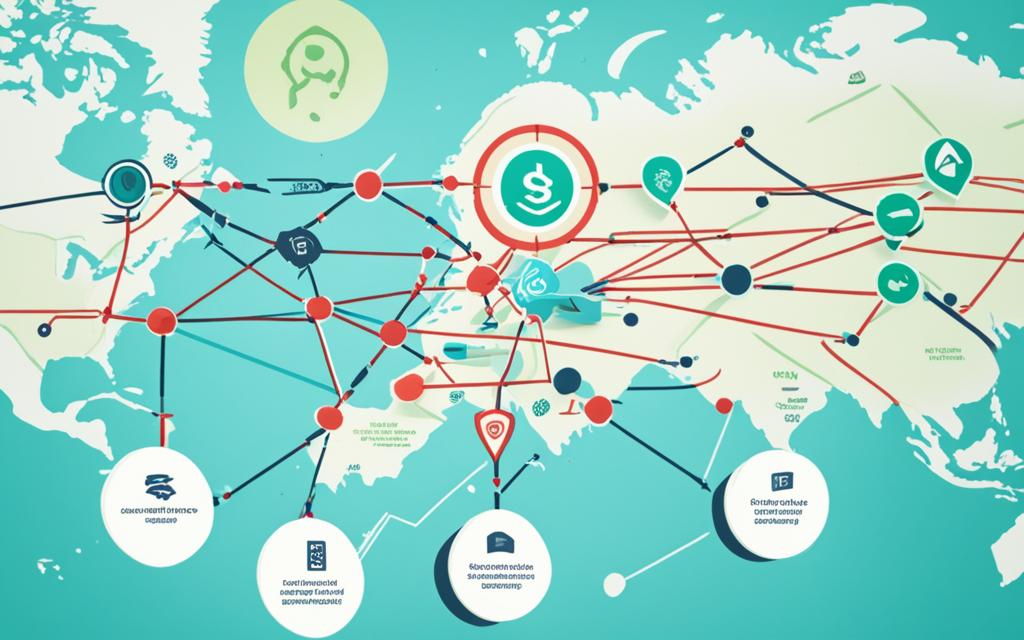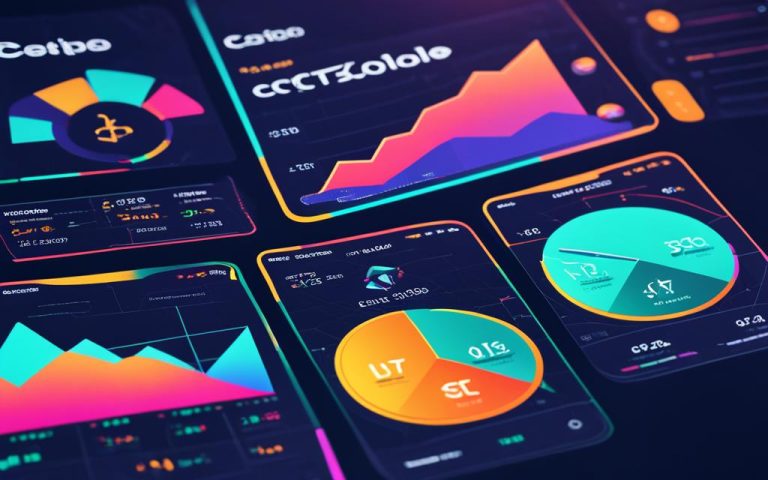DEX aggregators are changing the game for decentralized exchanges (DEXs). They let users access liquidity from many places at once. As the decentralized finance (DeFi) world grows, DEX aggregators are becoming essential for crypto traders looking for the best deals.
In simple terms, DEX aggregators pull together liquidity from different decentralized exchanges and professional market makers. This makes it easier to find great trading opportunities. They use liquidity from platforms like Uniswap, Aave, and Sushiswap. And they work across blockchains like Ethereum, Polygon, and Binance Smart Chain. Examples include Matcha and 0x’s Swap API.
With Matcha, traders get access to liquidity from professional market makers, improving their trade options. The 0x’s Swap API can pull liquidity from over 100 automated market makers (AMMs) and market makers across different blockchains. This gives users lots of choices, ensuring they get the best prices for their trades.
So, how do DEX aggregators work? Let’s check out these innovative platforms.
How Do DEX Aggregators Work?
DEX aggregators are platforms that let users work with many decentralized exchanges at once. They use advanced algorithms to gather and analyze data, helping users make better trade choices. Here’s a simple explanation of how they operate:
1. Aggregating Data from Decentralized Exchanges
DEX aggregators collect data from various decentralized exchanges. This includes info on token prices, liquidity, and trading volumes. By bringing this data together, they provide a broad view of the trading environment.
2. Comparative Analysis and Evaluation
The collected data goes through detailed analysis. Algorithms look at prices and liquidity on different exchanges. They aim to find the best trading opportunities and present them clearly.
3. Optimized Trade Decisions
Based on this analysis, users can make smart trade decisions. They can compare prices and swap rates across exchanges. This allows for more efficient trades with less risk.
4. Smart Order Routing
DEX aggregators use smart order routing to divide trades over several exchanges. Intelligent algorithms help avoid price slippage and transaction failures. This ensures the best outcomes for users.
5. Seamless User Experience
These platforms focus on providing a smooth and intuitive experience. Through one interface, users can explore various exchanges, find new tokens, and trade easily.
6. Empowering Users with Choice
DEX aggregators also give users choices. They can explore and compare features of different exchanges. This helps users refine their trading strategies and take advantage of each platform’s unique offerings.
By using aggregated data and advanced algorithms, DEX aggregators transform decentralized trading. They enable optimized decisions and access to a variety of exchanges. This innovative approach improves efficiency, liquidity, and versatility in decentralized finance.
| DEX Aggregators Features | Benefits |
|---|---|
| Aggregated data from multiple decentralized exchanges | Enables users to compare prices and liquidity across platforms |
| Sophisticated algorithms | Analyze various factors to find the best swap rates and minimize risks |
| Smart order routing | Optimizes efficiency and reduces price slippage |
| Streamlined user experience | Access multiple exchanges through a single interface |
| Empower users with choice | Explore and leverage unique features of different exchanges |
Benefits of Using DEX Aggregators
DEX aggregators bring several important benefits. For starters, they offer better swap rates than individual decentralized exchanges do. They find the best token swap rates by using many exchanges.
Also, DEX aggregators make swaps more efficient. They do this by dividing trades across different exchanges. This lowers the chance of swaps failing and raises the success rate.
Moreover, these platforms give users access to a wide variety of tokens and pairs. This means traders have more choices and can make trades more easily.
“Using a DEX aggregator like 1inch not only grants access to various decentralized exchanges but also empowers users with the ability to seamlessly navigate through different pools, ultimately enhancing their trading experience.”
Platforms like 1inch also help save on gas costs by burning gas tokens. They are designed on the Ethereum blockchain to reduce transaction fees. This makes trading more affordable for users.
In summary, DEX aggregators offer many benefits. These include better rates, efficient trades, a variety of options, and lower costs. All these improve trading in the DeFi world, making it smoother and more enjoyable.
Conclusion
Dex aggregators are changing decentralized finance by giving traders access to lots of liquidity sources. Platforms like Slingshot, 1inch, and Matcha link users to hundreds of exchanges. They let them optimize trades across networks like Ethereum and Binance Smart Chain. These aggregators check token pair price, liquidity, and fees to give traders good swap rates and lower costs. By using multiple exchanges, they ensure good price execution and enough liquidity.
But, users should know the downsides. Things like high fees and low liquidity for certain tokens can be issues. It’s crucial to research before trading on these platforms. Yet, Dex aggregators are improving to offer secure and private trading in the DeFi space.
Dex aggregators are becoming key as the DeFi ecosystem grows. They make decentralized trading easier with better pricing and liquidity. They help traders make smarter decisions and feel confident in the DeFi world.
For more details on Dex aggregators, look at these resources:
coincarp.com
medium.com (Dexa Exchange)
medium.com (Riya Thawani)
FAQ
What are DEX aggregators?
DEX aggregators combine liquidity from different decentralized exchanges. This lets users get the best trade prices.
How do DEX aggregators work?
They gather data from multiple decentralized exchanges. Users can compare prices and liquidity in one interface. This helps make informed trading decisions.
What are the benefits of using DEX aggregators?
They give users better swap rates than individual exchanges. Trades are split across various exchanges for efficiency.
They also provide access to wide liquidity and reduce gas costs with features like gas token burning.
How do DEX aggregators optimize trade routes?
They use advanced algorithms to find the best swaps. These algorithms consider prices, liquidity, and routes.
By splitting trades, they minimize price slippage and failed transactions.
How do DEX aggregators protect against potential risks?
They offer features like slippage protection and price impact protection. These help foresee and lessen trading risks on DEXs.
These features ensure trades are executed at desired prices, protecting users from adverse price movements.



















